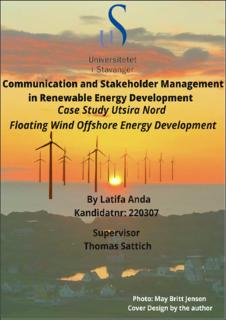| dc.description.abstract | This dissertation explored the nature of stakeholder interactions in Utsira Nord floating offshore wind energy development, the factors affecting it, and strategies for engagement and communication to sustain the green energy transition. Accordingly, the researcher chose several theories and conceptual frameworks to answer the research question and fulfill the research objectives. These include energy justice (e.g., Sovacool, 2014), MLP perspective (e.g., Geels, 2002), communication (e.g., Shannon & Weaver, 1949; Communication theory, 2020), discourse theory (e.g., Dryzek, 2013; Hajer, 1995) stakeholder theories (e.g., Weber et al., 2017), capability approach (Sen, 2004: Kato, Ashley & Weaver, 2017) and participatory approach (Mohan and Stokke 2000, Mohan 2001). The study followed a qualitative approach by interviewing ten actors in the green energy transition. A qualitative discourse analysis was employed, complemented with thematic and textual analysis.
The finding reveals that the nature of stakeholder interactions in the energy transition in the Ustira Nord involves diverse actors across multiple levels at the landscape, regime, and niche. These actors include government, developers, county municipality, municipality, neighbor municipalities, fisheries, maritime, civil society, and inhabitants. Their interactions are characterized by varying degrees of contestation, concerns, consensus, cooperation, and less conflict depending on the power, rules, voice, and interest. Utsira Municipality, with almost 200 inhabitants, played an essential intermediary role in facilitating, mobilizing, and lobbying for the green energy transition in Utsira Nord floating Offshore wind development.
In response to existing concerns and constraints, the Utsira Municipality has proactively and strategically managed to play a winner’s role. However, external and internal factors, including political, economic, social, technological, environmental, and legal, and the resources and capability, including lack of substantial power, affect Utsira municipality’s stakeholder interactions. Utsira municipality's objective is to add more socio-economic innovation developments and sustainable plans. Through positive storytelling, Utsira municipalities' values are highlighted in three simple words (Utsira Gir Energi), meaning Utsira gives energy, not any energy, but green energy that helps protect the planet and climate and adds more value to the community. Overall, the study's main finding is that community participation and capability building are essential energy justice strategies for sustainable communication and interaction between several actors and stakeholders in the green energy transition. | |
